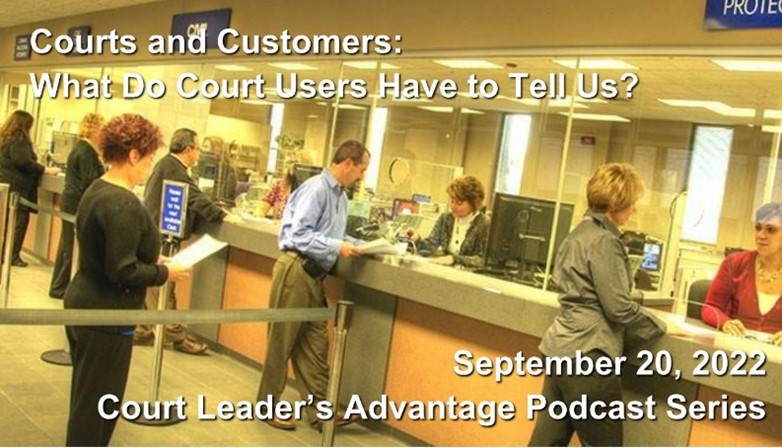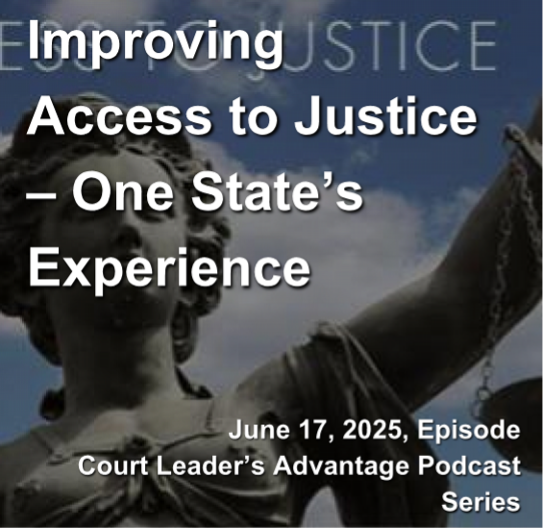Released on September 20, 2022.
Obtaining customer feedback, obtaining usable feedback, obtaining enough of it to be able to rationally modify court programs, all of these are major hurdles. And yet getting good customer feedback is so important. It is important to complete the loop: to plan, to act, to check results, and then to refine. And this effort has been made even more complicated by COVID.
LaGratta Consulting, with the backing of the State Justice Institute, has developed the Court Voices Project piloting 12 courts from around the country. These courts are collecting real-time, feedback from staff and court users about their pandemic experiences and their ideas. Some of the questions the Court Voices Project is trying to answer include, what percentage of court users prefer virtual hearings and why; have court users found new communication channels like phone banks and online chat features to be more convenient and more accessible; and what ideas do line-staff have for improving court practices?
This month we’re looking at court customers and how we collect feedback from them. Some topics we will explore include:
- How do we obtain more and better customer feedback?
- Why should court leaders focus on better ways to obtain feedback?
- What have courts been able to do with more enhanced feedback? and
- What advice do these panelists have for the rest of us?
Today’s Panel:
- The Honorable Clemens Landau, Judge with the Justice Court in Salt Lake City, Utah
- The Honorable Timothy Kuhlman, Judge with the Municipal Court in Toledo, Ohio
- James Cho, Court Administrator for the Municipal Court in Boulder, Colorado
- De’Von Kissick-Kelly, Deputy Court Administrator for the Municipal Court, in Boulder, and
- Emily LaGratta with La Gratta Consulting
Click here to listen to the podcast. The audio version is 36 minutes 40 seconds long and the video is 37 minutes 37 seconds long.
Leave a question or comment about the episode at clapodcast@nacmnet.org.
Show Notes
> About the Presenters
 Honorable Clemens Landau
Honorable Clemens Landau
Judge Clemens Landau is the Education Committee Co-Chair for the Utah Center for Legal Inclusion. Judge Landau was appointed to the Salt Lake City Justice Court in 2017 by Mayor Jackie Biskupski. Judge Landau received a law degree from the University of Utah in 2008. He worked as a civil litigator at Parr, Brown, Gee & Loveless before moving to the appellate firm of Zimmerman Jones Booher. Before becoming an attorney, Judge Landau worked as a paramedic in Boston and then managed a woodworking and music instrument-making company in Germany before going to law school. Judge Landau currently serves as the presiding judge of the Salt Lake City Justice court, and as a member of Utah’s Access to Justice Commission and the AOC’s Standing Committee on Technology. He also serves on the Executive Board of the Salt Lake County Bar Association, as a board member of the Utah Center for Legal Inclusion (a nonprofit organization dedicated to advancing the goals of equity and inclusion in Utah’s legal profession), and as a board member of the Utah Bar’s Leadership Academy. In addition, he teaches a Law and Literature class at the Utah State Prison that is part of the University of Utah’s Prison Education Project (UPEP). He is passionate about creating programs to help students of color succeed in pre-law programs and law school.
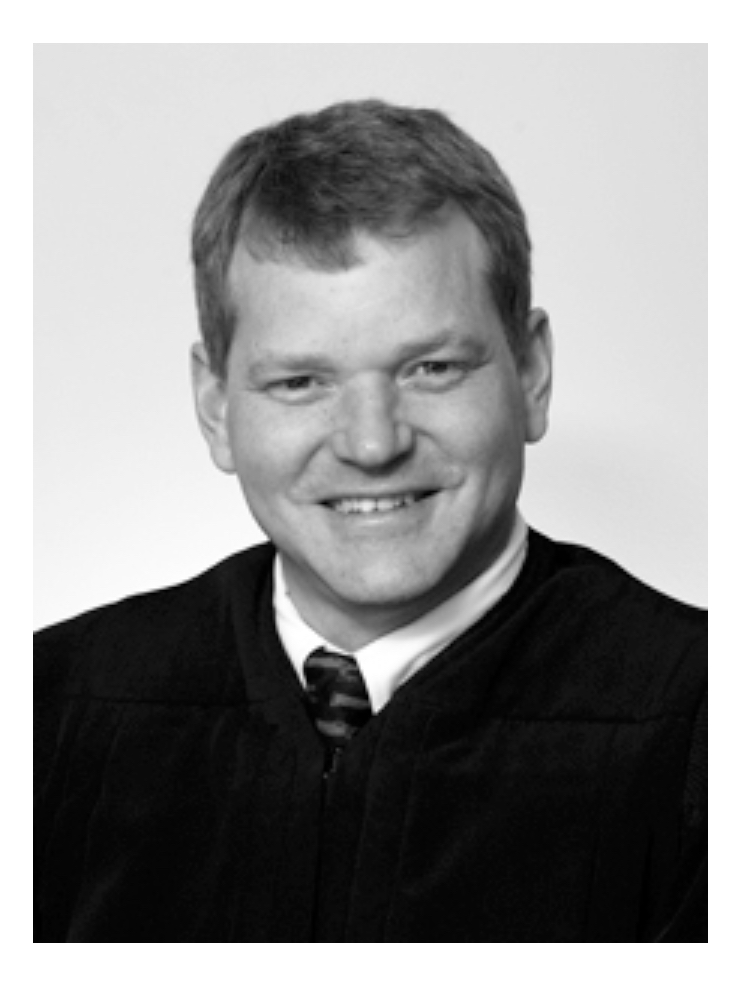 Honorable Timothy Kuhlman
Honorable Timothy Kuhlman
The Honorable Timothy Kuhlman was born and raised in Arlington, Ohio. He graduated from Hillsdale College in Michigan in 1988 and graduated from the University of Toledo Law School and joined the Ohio Bar in 1991.
During Law School he was a member of the Law Review and was a Prosecutor Intern in the Toledo Municipal Court. After graduation he became an associate at Eastman & Smith, Ltd., where he practiced for 14 years, trying more than 20 jury trials and handling more than 20 appeals.
In February 2005 he joined the Toledo Municipal Court and served as Presiding and Administrative Judge from 2007 through 2010, and again in 2019-2021. As Presiding Judge, he worked closely with the other Judges, the Toledo Bar Association, city and other government officials and interest advocacy groups to continue improvements in the Toledo Municipal Court to ensure efficiency of operations, budget saving measures, and justice for all people who are served by the Court.
Judge Kuhlman serves on the Lucas County Criminal Justice Coordinating Council as Vice Chair and Finance and Re-entry Committee Chairs. He works closely with the Domestic Violence Task Force to ensure safe and fair access to the Court for victims of domestic violence, and works with the YMCA Storer Camps on Camp Hope for children who witness violence. He works with the Re-entry Coalition of Northwest Ohio to give incarcerated offenders an opportunity to be successful citizens upon release, and since October 2011 has run a monthly re-entry docket where recently released offenders have an opportunity to address outstanding Toledo Municipal Court issues. Judge Kuhlman also serves on the Toledo Police Athletic League Board.
Judge Kuhlman has focused recent efforts on working with leadership in Lucas County to reduce its overall jail population, with particular focus on defendants of color, defendants with mental health, drug and alcohol issues and poverty. Judge Kuhlman serves on the Lucas County committee that successfully obtained a MacArthur Foundation Safety and Justice Challenge grant to continue to focus on these issues, and has worked with others in Lucas County and the Arnold Foundation (Arnold Ventures) to implement the Public Safety Assessment risk assessment bond tool. With others in that group, Judge Kuhlman presented at the University of Michigan Law School, Michigan Journal of Race and Law, at their seminar titled “Innocent Until Proven Poor, Fighting the Criminalization of Poverty” on February 20, 2016. Judge Kuhlman is part of the Leadership Team that has provided procedural justice training to over 600 people in the Toledo Lucas County Criminal Justice System; he taught procedural justice to participants of the Bureau of Justice Assistance Smart Suite Fellows Academy through Michigan State University and has been an instructor for the Ohio Supreme Court and the Municipal Court Judges Association on topics ranging from procedural justice to alternative bail practices. In October 2019 he participated with the Center for Court Innovation, the Joyce Foundation and Latham and Watkins for Risk Assessment, Violent Crime and the Fight to End Mass Incarceration: A National Judicial Leadership Summit.
Judge Kuhlman is married to Kathy and has two sons, Benjamin 14 and Scott 8.
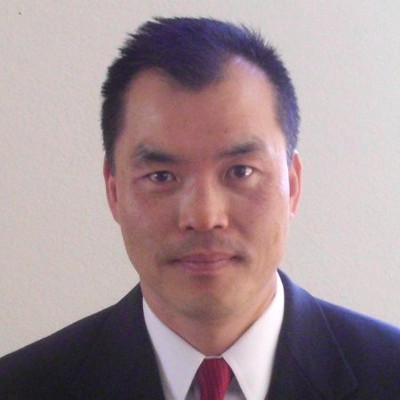 James Cho
James Cho
James Cho was named Municipal Court Administrator in June 2015 and has served as the Deputy Court Administrator since 2006. He first joined the City of Boulder in 1995 as a Records and Information Specialist for the Boulder Police Department, where he eventually held the position of Records Supervisor and Systems Administrator. He has also served as a Records Management Assistant in the Central Records division of the City Manager's Office.
As Director of Municipal Court operations, Cho oversees a $2 million annual budget and 17 employees. He directs the courts' processing of traffic, general, animal, parking, photo radar and photo red light violations and the collection of approximately $5.5 million in annual revenue. A key responsibility is the development of technology applications to improve operations.
Cho has served as a co-chair of the city's Inclusion and Diversity Team from 2010 to 2012. He earned his Bachelor of Science in Public Management from Colorado State University. He and his wife have called Boulder home for over 20 years
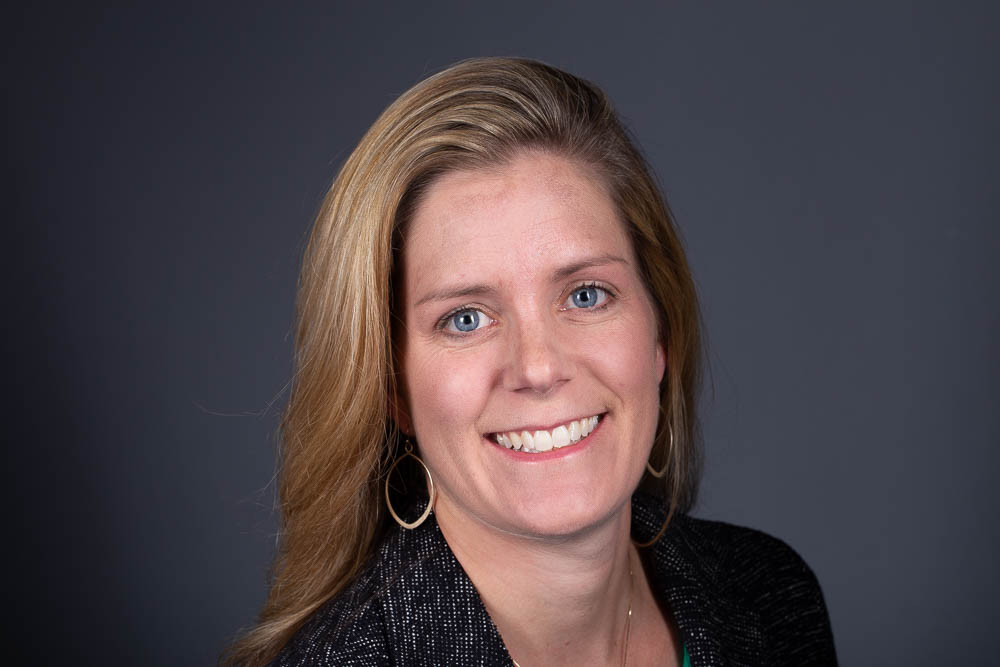 Emily LaGratta
Emily LaGratta
Emily LaGratta, J.D., is a national subject matter expert on the topics of procedural justice and user voice. In leading LaGratta Consulting, she works with local and national organizations to design and implement innovative programming, engage end-users and utilize their feedback, and develop practitioner resources and training tools that help enhance public trust and confidence in legal institutions. Recently, this has included the Court Voices Project, a 12-court pilot collecting real-time feedback from staff and court users about pandemic response practices. Emily has authored many relevant tools, including We Want to Hear From You!: A Toolkit and Measuring Perceptions of Fairness. She started LaGratta Consulting in 2019 after nearly ten years at the Center for Court Innovation.
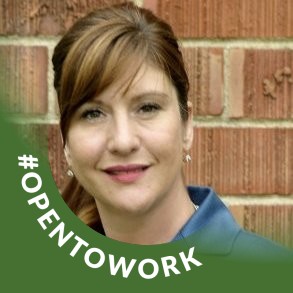 De’Von Kissick-Kelly
De’Von Kissick-Kelly De’Von Kissick-Kelly is the Deputy Court Administrator for the Boulder Municipal Court. Ms. Kissick-Kelly has devoted her career to empowering women through activism, advocacy and education. De’Von began her career with The Julian Center, a nationally recognized Family Justice Center. While there she helped to develop the Family Violence Outreach Advocate Program in cooperation with the Indianapolis Metropolitan Police Department (IMPD). She has presented at local, state, national, and international conferences on the issues of domestic violence, interagency collaboration, and transformative education. Ms. Kissick-Kelly has served as a Training and Technical Assistance Consultant for the Office of Victims of Crime, Ivy Tech Community College, and the Domestic Violence Network of Central Indiana. In 2012 she received an award from Indianapolis Mayor Greg Ballard for her work on the Baker One Project, a proactive policing initiative that brought local non-profit, governmental, and social service agencies together for the shared goal of holistically addressing the issue of domestic violence. Ms. Kissick-Kelly’s work with IMPD was featured on the WTHR Channel 13’s domestic violence awareness campaign, Shattering the Silence. Ms. Kissick-Kelly holds a B.S in Criminal Justice and Criminology and a M.A. in Adult and Community Education from Ball State University. My paper, A Case Study of Radical Adult Education and Transformative Learning through a Diverse Adult Learning Workshop, was published in The Journal of Transformative Education.

